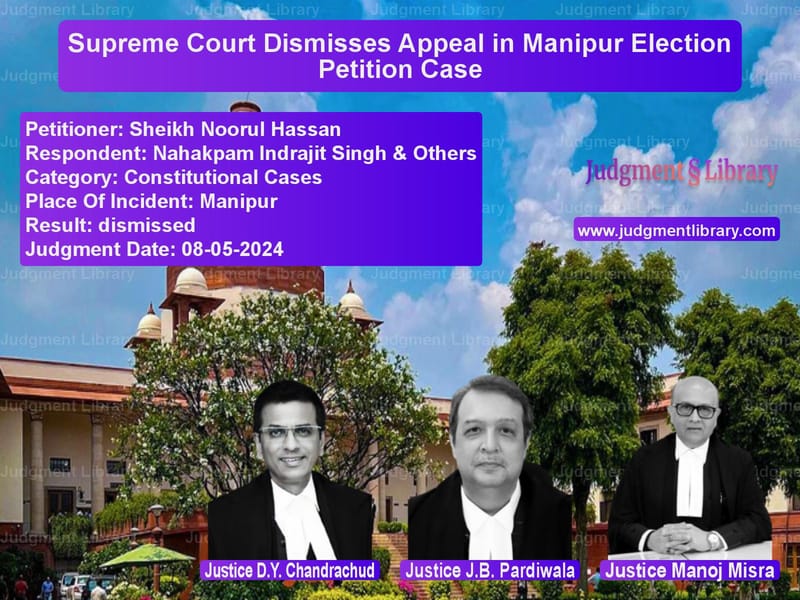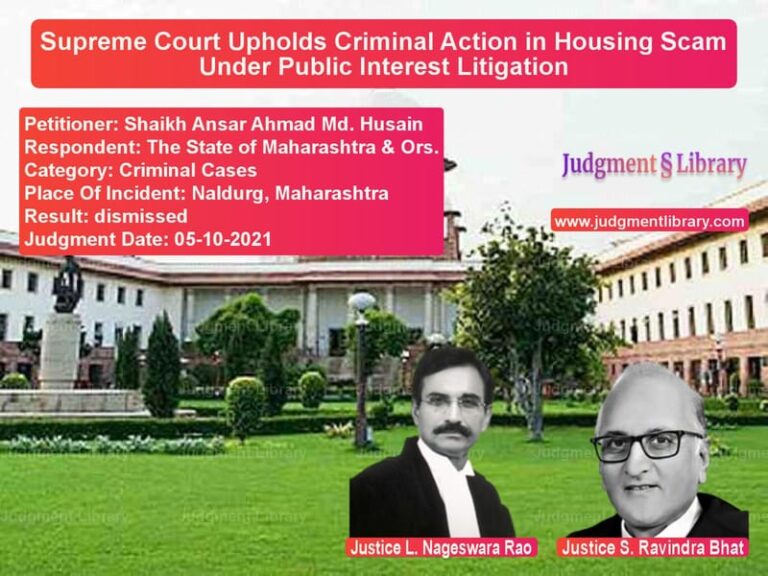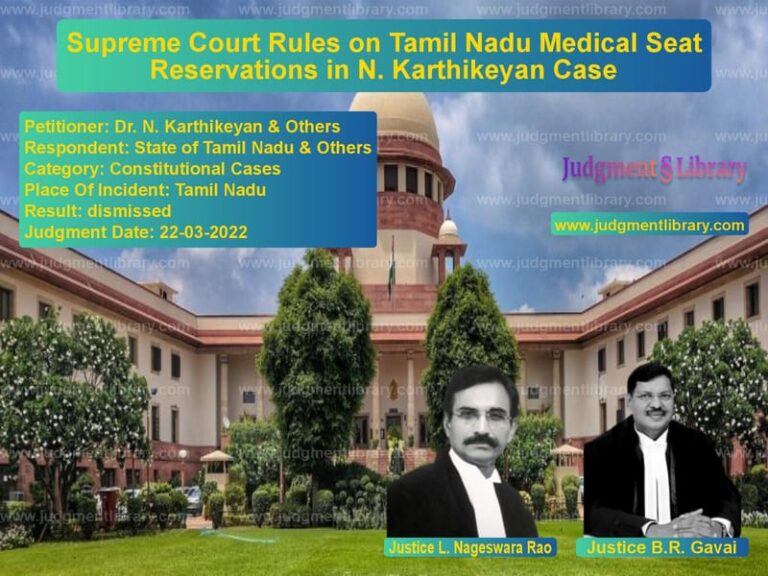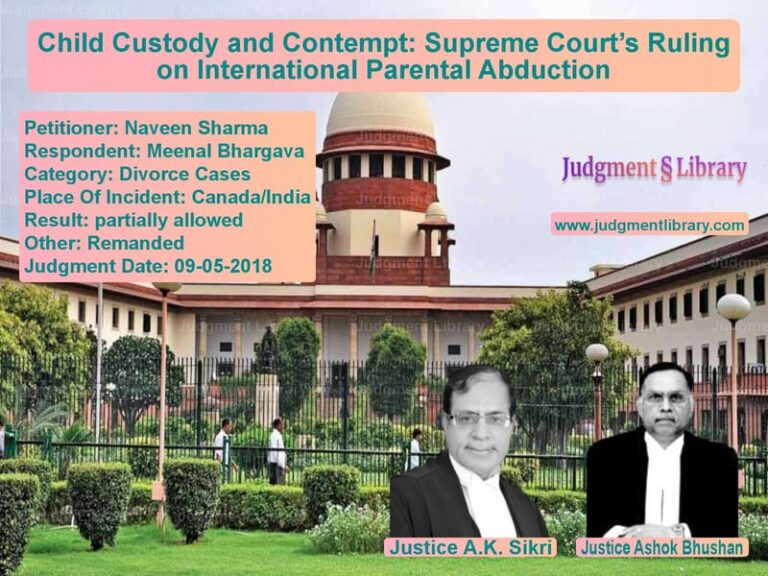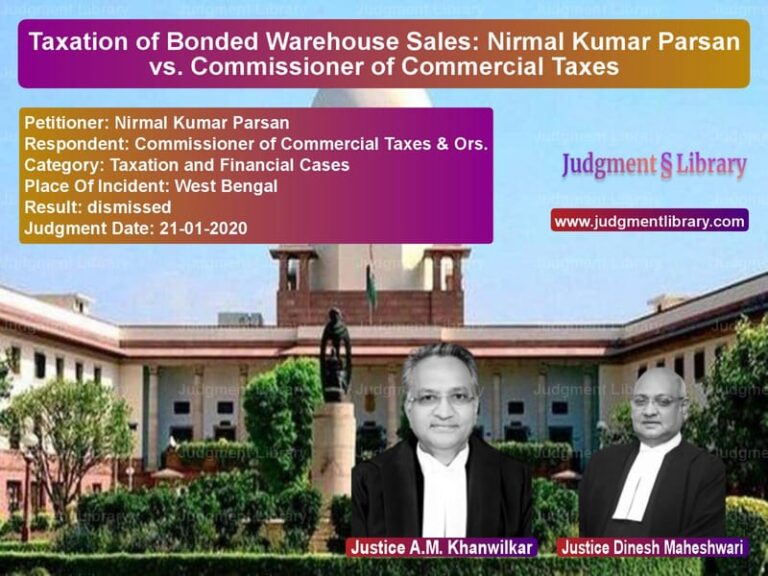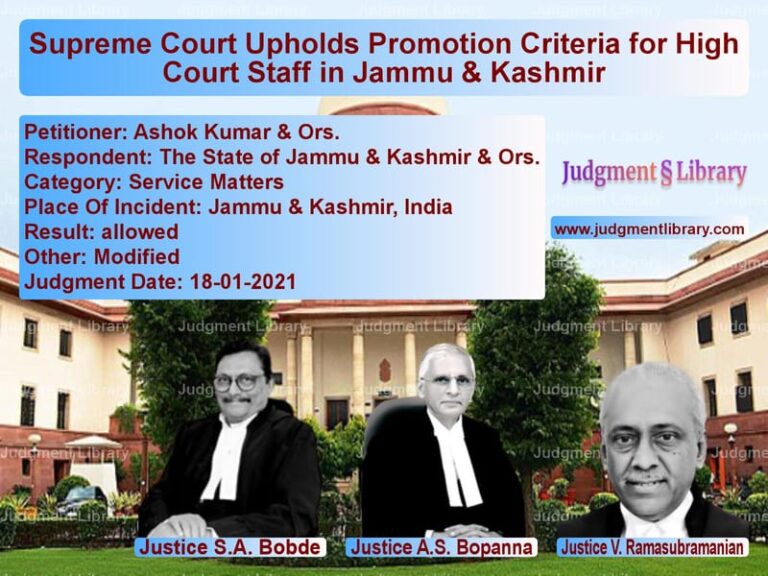Supreme Court Dismisses Appeal in Manipur Election Petition Case
The Supreme Court, in the case of Sheikh Noorul Hassan vs. Nahakpam Indrajit Singh & Others, ruled on a significant election dispute concerning alleged non-disclosure of financial details by a returned candidate in the 12th Manipur Legislative Assembly elections. The case primarily dealt with whether the election petitioner was entitled to file a replication to respond to new facts introduced by the returned candidate in his written statement.
Background of the Case
The respondent, Nahakpam Indrajit Singh, had contested the election results, seeking to have the election of Sheikh Noorul Hassan declared null and void under Section 100(1)(d)(i), (ii), and (iv) as well as Section 100(1)(b) of the Representation of the People Act, 1951. He also sought a declaration that he be recognized as the duly elected representative of the 4-Kshetrigao Assembly Constituency.
His primary contention was that Sheikh Noorul Hassan had failed to disclose crucial financial details in his nomination papers and affidavit (Form 26), including undisclosed bank accounts, liabilities, and ownership of a vehicle. These alleged omissions, he argued, materially affected the election outcome.
The returned candidate, Sheikh Noorul Hassan, contested these allegations in his written statement and introduced additional facts to explain his non-disclosures. Consequently, the election petitioner sought the High Court’s permission to file a replication to respond to these new claims.
The High Court granted this permission, prompting Sheikh Noorul Hassan to challenge the order in the Supreme Court, arguing that the election laws do not provide for a replication in response to a written statement.
Key Legal Issues Considered
- Whether the Representation of the People Act, 1951 permits the filing of a replication in an election petition.
- Whether the replication introduced new allegations or merely responded to new facts asserted by the returned candidate.
- Whether allowing a replication would violate the statutory 45-day limitation period for filing an election petition.
- Whether the High Court exercised its discretion correctly in permitting the replication.
Arguments by the Petitioner (Sheikh Noorul Hassan)
The petitioner’s counsel, Mr. Shyam Divan, contended:
- The Representation of the People Act, 1951, is a self-contained code and does not permit a replication as a matter of right.
- Permitting the replication effectively allows the election petitioner to amend his petition after the statutory limitation period of 45 days, which is impermissible.
- The replication introduced new allegations rather than merely responding to the written statement.
- Allowing the replication would set a bad precedent, opening the door for litigants to bypass statutory limitations.
Arguments by the Respondent (Nahakpam Indrajit Singh)
The respondent’s counsel, Mr. Anupam Lal Das, countered:
- Section 87 of the Representation of the People Act allows election petitions to be tried as civil suits, and Order VIII Rule 9 of the Civil Procedure Code (CPC) permits the filing of a replication with the court’s leave.
- The replication was not introducing new allegations but merely responding to explanations and justifications introduced by the returned candidate in his written statement.
- Given the new facts raised in the written statement, the election petitioner was entitled to rebut those claims to ensure a fair trial.
Supreme Court’s Findings
The Supreme Court examined the legal framework and previous rulings regarding subsequent pleadings in election petitions.
1. Permissibility of Replication in Election Petitions
The Court clarified that while the Representation of the People Act does not expressly allow a replication, Section 87 allows election petitions to follow the procedure of civil suits. As per Order VIII Rule 9 of the CPC, subsequent pleadings are permitted if the court grants leave.
2. Nature of the Replication
The Court analyzed the replication and found that:
- It did not introduce new allegations but merely sought to counter fresh claims made in the returned candidate’s written statement.
- The election petitioner was merely providing additional clarifications, which were necessary for a fair trial.
3. Timeliness and Prejudice
The Court held that:
- The replication was filed within a reasonable time after the written statement was submitted.
- Since the written statement introduced fresh explanations, allowing the replication did not amount to an undue advantage.
Final Ruling
The Supreme Court dismissed the appeal, stating:
“The replication does not introduce any new material facts or change the nature of the election petition. It merely responds to the explanations offered in the written statement. Allowing the replication ensures a fair and effective trial.”
Accordingly, the Court upheld the High Court’s decision to permit the replication.
Implications of the Judgment
- Clarifies Election Petition Procedure: The ruling confirms that replications can be allowed in election disputes if they are meant to counter new facts introduced in the written statement.
- Ensures Fair Trials: By allowing responses to fresh claims, the Court reinforced the principle of fairness in election litigation.
- Limits Abuse of Legal Technicalities: The judgment prevents returned candidates from introducing new facts in their defense while denying the election petitioner a chance to respond.
Conclusion
The Supreme Court’s ruling in this case strengthens procedural fairness in election disputes. It ensures that parties cannot misuse technicalities to evade scrutiny and that all claims and counterclaims are duly addressed in court. By upholding the High Court’s decision, the Court has reinforced the principle that the election process must be transparent and accountable.
Petitioner Name: Sheikh Noorul Hassan.Respondent Name: Nahakpam Indrajit Singh & Others.Judgment By: Justice D.Y. Chandrachud, Justice J.B. Pardiwala, Justice Manoj Misra.Place Of Incident: Manipur.Judgment Date: 08-05-2024.
Don’t miss out on the full details! Download the complete judgment in PDF format below and gain valuable insights instantly!
Download Judgment: sheikh-noorul-hassan-vs-nahakpam-indrajit-si-supreme-court-of-india-judgment-dated-08-05-2024.pdf
Directly Download Judgment: Directly download this Judgment
See all petitions in Fundamental Rights
See all petitions in Public Interest Litigation
See all petitions in Judgment by Dhananjaya Y Chandrachud
See all petitions in Judgment by J.B. Pardiwala
See all petitions in Judgment by Manoj Misra
See all petitions in dismissed
See all petitions in supreme court of India judgments May 2024
See all petitions in 2024 judgments
See all posts in Constitutional Cases Category
See all allowed petitions in Constitutional Cases Category
See all Dismissed petitions in Constitutional Cases Category
See all partially allowed petitions in Constitutional Cases Category

